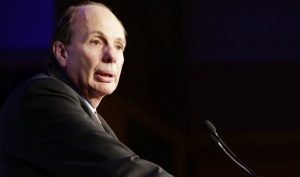The Federal Government is completely isolated in its belief that the Clean Energy Target should be scrapped after Origin Energy, Transgrid and Business Council of Australia President Grant King backed the Finkel proposal.
The backing was given at the National Energy Summit organised by the Australian Financial Review.
On Day 1, Energy Minister Josh Frydenberg gave the biggest signal to date that the government will not implement the Clean Energy Target as proposed by Chief Government Scientist Alan Finkel. Mr Frydenberg suggested that such a support policy is not needed for renewable and clean energy investments given the rapidly falling costs of the technologies.
Mr Finkel said that the CET was needed and he defended the proposal vigorously and was supported by Labor Leader Bill Shorten, South Australia Premier Jay Weatherill, Australian Energy Market Operator Chief Audrey Zibelman, AGL Chief Andy Vesey and others.
The conference continued in the same vein on Day 2, with Origin’s Frank Calabria, Transgrid’s Paolo Italiano and Mr King saying that some form of scheme is needed to encourage investment in new supply after 2020 that would bring down prices.

Mr King said if the government is not going to pursue the policy, which was recommended in the Finkel Review, “then it needs to provide an alternative model to the business community as a matter of priority.”
Mr King said the BCA has been a strong supporter of some sort of signal from the government for how emissions will be treated into the future and so has supported Professor Alan Finkel’s recommendations.
“We remain a strong supporter of providing that signal and the provision of policy stability to the energy market more broadly,” he said.
Mr King said the group has always backed the Clean Energy Target proposal, but noted it restricted the task of reducing emissions to the energy sector, whereas it should be an economy-wide issue.
“Deals don’t get done unless everyone wants to do it”, Mr King said of the failed consensus on an emissions reduction scheme. “The lack of bi-partisanship has made the energy price crisis worse than it would otherwise have been.”
“Climate is an economy-wide problem, the CET makes it an energy problem,” he said.
“There’s a good argument for decoupling climate and energy, and fixing reliability and affordability of energy away from a climate change lens.”
Clean Energy Target is not about subsidies but investment – Frank Calabria

Mr Calabria said the Renewable Energy Target supports investment in cleaner energy only until the end of the decade and the signals to invest further are lacking unless a new long-term policy framework is put in place.
“We need credible, bipartisan energy and climate change policy beyond 2020 to unlock supply and propel investment to make energy markets, once again, work for our customers,” Mr Calabria said. “Doing nothing will see prices again move in an upwards direction.”
Mr Calabria said households and businesses are now paying the price of the failure of industry and governments to work together to develop a cohesive national energy policy over the past decades.
“We desperately need some strong leadership” on energy policy, he said. He said the CET is “a workable solution” and “better than no solution at all”.
He said a CET provides a technology-neutral investment signal that provides a signal for emissions reductions and provide confidence for future investment in new generators to allow for the gradual closure of coal-fired plants, necessary to meet the country’s emissions reductions targets set in the Paris climate accord.
Discussion around whether the CET provides an unnecessary subsidy was on the wrong track, Mr Calabria said.
“Everyone seems to be focused on whether the Clean Target is a subsidy or not. The reality is we’ve got to attract new investment and in the absence of any other signal today what would do today you would invest in renewables,” he said.
But when large coal generators such as Hazelwood are leaving the market, enough early investment needs to be made in new generation to prevent a spike in prices, he said, taking a similar position to Andy Vesey, chief executive of AGL Energy.
Mr Calabria said consumers aren’t so worried about how the current situation came to be, but just wanted government and industry show leadership in the area to get it fixed.
“They are looking for us to get on with it. They just want to know how we’re going to move forward.”
Mr Calabria also appealed to leave the National Electricity Market as they are and just to “quickly adapt” it to suit changing conditions.
The energy system is “at a major crossroads” as the NEM approaches its 20th birthday, he said, so the time is ripe to ask whether it is still effective for the changed realities of today. “The market does need to be quickly adapted, but the market works if you let it,” he said.
Mr Calabria also said Origin had been shoring up its coal and gas supplies to ensure fuel for its power plants over the coming summer and had carried out maintenance to give its plants the best chance to keep running reliably.
TransGrid Chief says Clean Energy Target is the responsible option

TransGrid’s Paul Italiano said the government should endorse the Finkel Review’s recommendations.
He said: “The Finkel Review has provided an economically rational and socially responsible path to planning and implementing an affordable, sustainable energy system of the future, and we would call on the government to adopt the recommendations.”
Mr Italiano has already backed the Clean Energy Target and has been quite vociferous, saying that doing nothing is irresponsible and will push energy prices up in the future.














